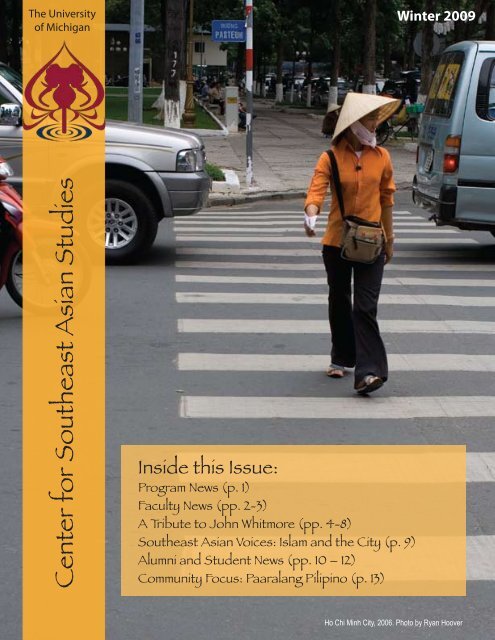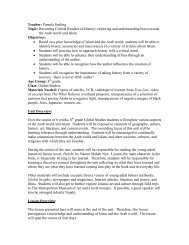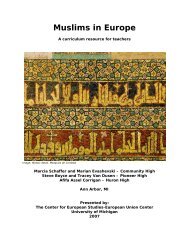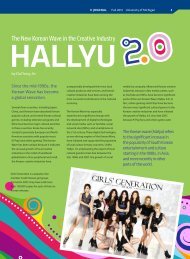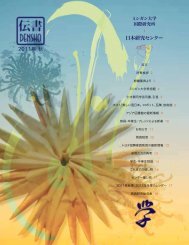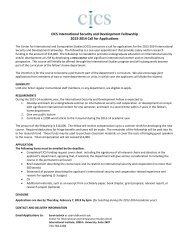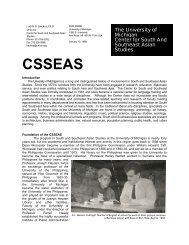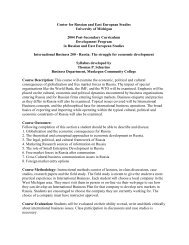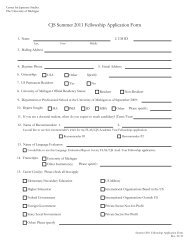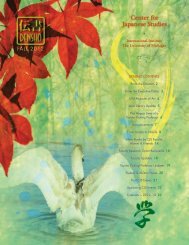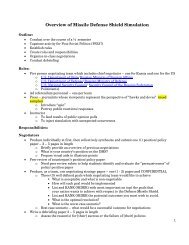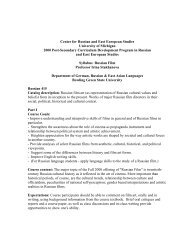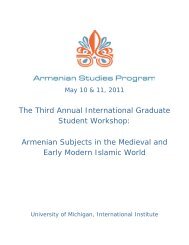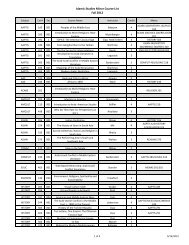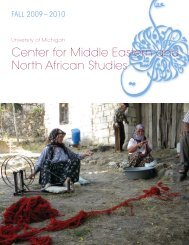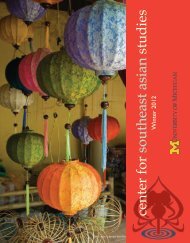Center for Southeast Asian Studies - International Institute ...
Center for Southeast Asian Studies - International Institute ...
Center for Southeast Asian Studies - International Institute ...
Create successful ePaper yourself
Turn your PDF publications into a flip-book with our unique Google optimized e-Paper software.
The University<br />
of Michigan<br />
Winter 2009<br />
Fall 2008<br />
<strong>Center</strong> <strong>for</strong> <strong>Southeast</strong> <strong>Asian</strong> <strong>Studies</strong><br />
Inside this Issue:<br />
Program News (p. 1)<br />
Faculty News (pp. 2-3)<br />
A Tribute to John Whitmore (pp. 4-8)<br />
<strong>Southeast</strong> <strong>Asian</strong> Voices: Islam and the City (p. 9)<br />
Alumni and Student News (pp. 10 – 12)<br />
Community Focus: Paaralang Pilipino (p. 13)<br />
Ho Chi Minh City, 2006. Photo by Ryan Hoover
From CSEAS Director Professor Allen Hicken<br />
This has been a rich, full year at<br />
the <strong>Center</strong> <strong>for</strong> <strong>Southeast</strong> <strong>Asian</strong><br />
<strong>Studies</strong>. Over the course of the<br />
academic year we have hosted<br />
or co-sponsored more than two<br />
dozen separate talks, lectures,<br />
exhibitions and per<strong>for</strong>mances.<br />
These include an exhibition of<br />
photographs from Cambodia, a<br />
visit and keynote address from<br />
ASEAN Secretary General Surin<br />
Pitsuwan in conjunction with<br />
the Asia Business Conference,<br />
and a visit from Dr. Benedict Anderson. Our Friday noon<br />
lectures have addressed topics as wide-ranging as conflict<br />
in Southern Thailand, Filipino poetry, development in<br />
Indonesia, and the politics of history in Vietnam. New this<br />
year, the audio from many of our Friday noon lectures are<br />
available <strong>for</strong> listening at http://www.ii.umich.edu/cseas/<br />
events/multimedia.<br />
We are please to devote part of this newsletter (pp. 4-8)<br />
to a tribute to John Whitmore. John retired this year from<br />
the University after nearly 38 years of service. During this<br />
time he has been a steady <strong>for</strong>ce and constant advocate<br />
<strong>for</strong> <strong>Southeast</strong> <strong>Asian</strong> studies. As John retires from U-M we<br />
keenly feel the loss, but know that his role as mentor,<br />
gentle critic, and erudite scholar will continue.<br />
In February we teamed with the <strong>Center</strong> <strong>for</strong> South <strong>Asian</strong><br />
<strong>Studies</strong> to present Urban Flow—an inter-disciplinary,<br />
multi-media, theatre production that explored the changing<br />
nature of urban spaces and how these changes affect<br />
the daily life experiences of urban residents in South and<br />
<strong>Southeast</strong> Asia. U-M students from <strong>Southeast</strong> Asia and the<br />
United States partnered with faculty experts and two guest<br />
directors to produce original script that was then prepared<br />
<strong>for</strong> the stage. You can read more about this innovative<br />
theatre piece on p. 9 of this newsletter.<br />
In March we teamed with Georgetown University to organize<br />
and host a two day conference on Pluralism and Democracy<br />
in <strong>Southeast</strong> <strong>Asian</strong> Islam. The conference brought<br />
together prominent scholars and public intellectuals from<br />
Indonesia, Malaysia, the Philippines, Singapore and Thailand<br />
and scholars interested in political Islam from across<br />
the University. The discussions tackled a series of difficult<br />
issues, including the relationship between religion and the<br />
state, what is “authentic” when it comes to religious belief<br />
and practice, and who defines what “authentic” is and is<br />
not. More details about the conference can also be found<br />
on p. 9.<br />
The <strong>Center</strong> has been taking steps to boost language enrollments<br />
in our four SEA languages by organizing a scholarship<br />
program <strong>for</strong> undergraduate students who enroll in our<br />
language courses. The response to the call <strong>for</strong> applications<br />
was impressive, and we were able to make a total of eleven<br />
$1000 awards <strong>for</strong> first-year language study, spread across<br />
all four of our languages. Our goal is to raise enough funds<br />
to be able to award $15,000 in scholarships each year <strong>for</strong><br />
each of our four languages, and thus secure the future of<br />
<strong>Southeast</strong> Asia language study at U-M.<br />
Finally, as my term as interim director comes to a close I<br />
want to thank the alumni, students, faculty, and staff <strong>for</strong><br />
helping make this such an enjoyable and productive year.<br />
Special thanks to the members of the executive committee,<br />
Christi-Anne Castro, Susan Go, Nick Rine, Gavin Shatkin,<br />
and Fred Wherry, and to the <strong>Center</strong> staff, Gigi Bosch,<br />
Cindy Middleton, and Charley Sullivan, <strong>for</strong> all their hard<br />
work and service.<br />
<strong>Center</strong> <strong>for</strong> <strong>Southeast</strong> <strong>Asian</strong> <strong>Studies</strong><br />
1080 S. University, Ste. 3603<br />
Ann Arbor, MI 48109<br />
734.764.0352 (Phone)<br />
734.936.0996 (Fax)<br />
www.ii.umich.edu/cseas<br />
Regents of the University<br />
Julia Donovan Darlow, Ann Arbor<br />
Laurence B. Deitch, Bingham Farms<br />
Olivia P. Maynard, Goodrich<br />
Rebecca McGowan, Ann Arbor<br />
Andrea Fischer Newman, Ann Arbor<br />
Andrew C. Richner, Grosse Pointe Park<br />
S. Martin Taylor, Grosse Pointe Farms<br />
Katherine E. White, Ann Arbor<br />
Mary Sue Coleman (ex officio)<br />
The University of Michigan, as an equal opportunity/affirmative action employer, complies with all applicable federal and state laws regarding nondiscrimination<br />
and affirmative action, including Title IX of the Education Amendments of 1972 and Section 504 of the Rehabilitation Act of 1973. The<br />
University of Michigan is committed to a policy of nondiscrimination and equal opportunity <strong>for</strong> all persons regardless of race, sex*, color, religion, creed,<br />
national origin or ancestry, age, marital status, sexual orientation, disability, or Vietnam-era veteran status in employment, educational programs and<br />
activities, and admissions. Inquiries or complaints may be addressed to the Senior Director <strong>for</strong> Institutional Equity and Title IX/Section 504 Coordinator,<br />
Office of Institutional Equity, 2072 Administrative Services Building, Ann Arbor, Michigan 48109-1432, 734-763-0235, TTY 734-647-1388. For other University<br />
of Michigan in<strong>for</strong>mation call 734-764-1817.
Program News<br />
1<br />
New <strong>Southeast</strong> Asia Gallery at the expanded Museum of Art<br />
On March 28, 2009, the University<br />
of Michigan Museum of Art (UMMA)<br />
opened a landmark 53,000-squarefoot<br />
expansion and major restoration<br />
of its historic,<br />
41,000-square-foot home,<br />
Alumni Memorial Hall.<br />
Designed by principal<br />
architect Brad Cloepfil and<br />
his team at Allied Works<br />
Architecture, the $41.9<br />
million trans<strong>for</strong>mation not<br />
only more than doubled<br />
the space available <strong>for</strong> collections<br />
display, temporary<br />
exhibitions, programs and<br />
educational exploration,<br />
but also fulfilled the Museum’s<br />
mission to bridge<br />
visual art and contemporary<br />
culture, scholarship<br />
and accessibility, tradition<br />
and innovation.<br />
The expansion includes new gallery<br />
space, part of a multi-story atrium<br />
in the museum’s new Frankel Family<br />
Wing, to display parts of the museum’s<br />
<strong>Southeast</strong> Asia collections. The UMMA<br />
collection of <strong>Southeast</strong> <strong>Asian</strong> art is<br />
focused on Buddhist and Hindu sculpture<br />
from Thailand, Cambodia, Myanmar<br />
and Indonesia. A recent major<br />
gift from the Doris Duke Foundation<br />
helped to expand the Buddhist art<br />
collection, which includes a complete<br />
set of Thai Buddhist altar and lacquerware,<br />
Chinese ceramics made <strong>for</strong> Thai<br />
market, and Burmese sculpture. There<br />
is also a small but significant collection<br />
of ceramics, including Neolithic<br />
wares of the Ban Chieng culture and-<br />
Sawankhalok ware from Thailand; and<br />
Vietnamese trade ware.<br />
Pride of place in the new space goes<br />
to the Bangkok-era Buddhist altar,<br />
pieces not originally part of the same<br />
grouping but that represent the types<br />
of objects that would have been<br />
found on a Thai altar dating to the late nineteenth or early twentieth century.<br />
Other objects in the collection are visible within the open space of the atrium,<br />
creating visually stunning interactions between pieces of art from different<br />
regions and eras.<br />
Not all the objects are ancient. One of the Museum’s<br />
newest acquisitions, made possible by the generosity<br />
of Guy and Nora Barron, is a modern piece by Cambodian<br />
sculptor Ouk Chim Vichet. Called Apsara Warrior,<br />
this imposing metal piece represents an Apsara dancer.<br />
Apsara dance, distinguished by stylized hand gestures<br />
and sinuous body movements, dates back to the first<br />
century, when it was per<strong>for</strong>med <strong>for</strong> royalty to honor<br />
gods and dynastic ancestors. Along with all court culture,<br />
Apsara, both the dance and the dancers, fell victim<br />
to the Khmer Rouge policies of cultural cleansing, only<br />
recently re-emerging alongside other <strong>for</strong>ms of classical<br />
Khmer culture. Vichet’s Apsara, made of detonated<br />
AK-47s, wears the traditional headdress and poses on a<br />
heap of discarded guns while breaking another gun in<br />
two. The meaning of her gesture is unmistakable; this<br />
Apsara warrior stands <strong>for</strong> peace.<br />
ASEAN Secretary General Surin Visits Michigan<br />
The 19th annual Asia Business Conference<br />
drew over 600 participants from<br />
business, government, faculty and<br />
students on February 6-7. The keynote<br />
speaker <strong>for</strong> the event, Dr. Surin<br />
Pitsuwan, ASEAN Secretary General,<br />
delivered a talk on “Asia: Globalization<br />
and Trans<strong>for</strong>mation” to a packed<br />
house in the Ross School of Business’<br />
new Blau Auditorium. (Video of the<br />
speech is available online at http://<br />
tinyurl.com/dhha7k.) During his threeday<br />
stay in Ann Arbor, Dr. Surin also<br />
met with students from ASEAN and<br />
with <strong>Southeast</strong> <strong>Asian</strong> <strong>Studies</strong> faculty<br />
and graduate students at CSEAS. One<br />
goal of the visit was to promote stronger<br />
connections between ASEAN and<br />
the University, and ASEAN and the<br />
United States more generally. Discussions<br />
touched on how to increase<br />
American students’ ties to ASEAN, and<br />
how to better foster ease of research<br />
by American academics, including<br />
multi-national projects. <strong>Center</strong> Director,<br />
Allen Hicken, and Outreach Coordinator,<br />
Charley Sullivan, each met<br />
with Dr. Surin and discussed the vital<br />
roles that National Resource <strong>Center</strong>s<br />
like CSEAS play in promoting connections<br />
between the United States<br />
and <strong>Southeast</strong> Asia and in building<br />
a cadre of scholars and practitioners<br />
knowledgeable about the region and<br />
capable of constructive engagement<br />
with it. Dr. Surin was accompanied on<br />
his trip by CSEAS alumnus M. Rajaretnam<br />
(MA, 1971,) who is now the<br />
Special Advisor to Dr. Surin on Community<br />
Building and Outreach <strong>for</strong> the<br />
association. Both Dr. Surin and Raja<br />
were excited to find out from Prof.<br />
Emeritus and <strong>for</strong>mer CSEAS Director<br />
Pete Gosling that the name ASEAN<br />
had in fact been coined at Michigan,<br />
as Russell Fifield, long-time professor<br />
of Political Science, used it first in his<br />
book <strong>Southeast</strong> Asia in United States<br />
Policy, published <strong>for</strong> the Council on<br />
Foreign Relations in 1963.
2<br />
Faculty News<br />
Congratulations to Agustini (Indonesian<br />
Language) who has been<br />
appointed the Language Coordinator<br />
<strong>for</strong> <strong>Southeast</strong> <strong>Asian</strong> and Korean<br />
languages in the Department of <strong>Asian</strong><br />
Languages and Cultures. She will<br />
take up her duties in earnest after she<br />
returns from leading 15 undergraduates<br />
to Global Intercultural Experience<br />
<strong>for</strong> Undergraduates (GIEU) field sites in<br />
Bali and Central Java in May and June.<br />
agustini@umich.edu<br />
In March, Christi-Anne Castro<br />
(Musicology) delivered a paper at the<br />
national Society <strong>for</strong> American Music<br />
conference in Denver about popular<br />
songs and songs of the American military<br />
during the Filipino-American War.<br />
During Fall 2009 she will be teaching<br />
a graduate seminar on music and<br />
nationalism from a global perspective.<br />
ccastro@umich.edu<br />
Nancy Florida (<strong>Asian</strong> Languages and<br />
Cultures) returned to Java during<br />
the winter semester (hurray! it was<br />
great!) <strong>for</strong> a well-earned sabbatical<br />
after completing her duties as Chair<br />
of <strong>Asian</strong> Languages and Cultures.<br />
She has published an article in Public<br />
Culture 20: 3 (Fall 2008): “A Proliferation<br />
of Pigs: Specters of Monstrosity in Re<strong>for</strong>mation<br />
Indonesia,” and presented a<br />
preliminary paper on Rongggawarsita,<br />
Java’s <strong>for</strong>emost “classical” poet at a<br />
conference in Budapest, Hungary in<br />
May. Nancy will offer a new course in<br />
the fall: “From Mystic Saints to Holy<br />
Warriors: Islam in <strong>Southeast</strong> Asia.”<br />
nflorida@umich.edu<br />
Nancy Florida in the Kraton Surakarta library<br />
Webb Keane (Anthropology)<br />
gave the Annette Weiner<br />
Memorial Lecture at New York<br />
University and the D.R. Sharpe<br />
Lecture in Social Ethics at<br />
the University of Chicago,<br />
both in April 2009. His book,<br />
Christian Moderns, will be the<br />
subject of a special session<br />
at the Academy of American<br />
Religion annual meetings in<br />
the fall of 2009. He has also<br />
been awarded a University of<br />
Michigan Faculty Recognition<br />
Award. wkeane@umich.edu<br />
Stuart Kirsch (Anthropology) was in<br />
Manila in March, 2009 to participate<br />
in an international conference on<br />
extractive industries and indigenous<br />
peoples, which was organized by the<br />
Philippines NGO Tebtebba (Indigenous<br />
Peoples’ <strong>International</strong> Centre<br />
<strong>for</strong> Policy Research and Education). In<br />
addition, he was an invited expert <strong>for</strong><br />
a U.N. Permanent Forum on Indigenous<br />
Issues workshop on Indigenous<br />
Peoples’ Rights, Corporate Accountability<br />
and the Extractive Industries,<br />
also held in Manila.<br />
skirsch@umich.edu<br />
John Knodel (Sociology, Emeritus)<br />
writes: “I am spending the winter<br />
semester in <strong>Southeast</strong> Asia to attend<br />
conferences, give guest lectures, and<br />
conduct collaborative research with<br />
the Faculty of Nursing and the College<br />
of Population <strong>Studies</strong> at Chulalongkorn<br />
University, Bangkok, Thailand<br />
and the <strong>Institute</strong> of Sociology, Hanoi,<br />
Vietnam.” jknodel@umich.edu<br />
Vic Lieberman (History) received an<br />
Honorary Fellowship in recognition of<br />
his scholarship from SOAS, University<br />
of London, in July. Vic continues to<br />
publish prolifically, with two articles<br />
coming to print in the last year:<br />
“Protected Rimlands and Exposed<br />
Zones: Reconfiguring Early Modern<br />
Eurasia,” Comparative <strong>Studies</strong> in Society<br />
Agustini, with her student Jason Lapadula<br />
and History 50, 3 (July, 2008): 692-723;<br />
and “The Qing and Their Neighbors:<br />
Early Modern China in World History,”<br />
Social Science History 32, 2 (Summer,<br />
2008): 281-304. He also has several<br />
pieces currently at press, including the<br />
second volume of his award-winning<br />
work, Strange Parallels: <strong>Southeast</strong> Asia<br />
in Global Context. c. 800-1830. Volume<br />
2. Mainland Mirrors: Europe, Japan,<br />
China, South Asia, and the Islands<br />
(Cambridge: Cambridge University<br />
Press, 2009). Finally, he has written<br />
an article in honor of John Whitmore,<br />
(thoughts also reflected in a short<br />
piece on pp. 4-6 of this newsletter),<br />
“John K. Whitmore’s Contribution<br />
to Vietnamese and <strong>Southeast</strong> <strong>Asian</strong><br />
<strong>Studies</strong>,” in Kenneth Hall and Michael<br />
Aung-Thwin, eds., Essays in Honor of<br />
John Whitmore. (<strong>for</strong>thcoming).<br />
eurasia@umich.edu<br />
Linda Lim (Strategy) gave lectures<br />
on Asia in the global financial crisis<br />
to various U-M groups in the Fall, and<br />
at Stan<strong>for</strong>d University’s Shorenstein<br />
<strong>Center</strong> in January 2009. She also<br />
spoke at the Civil Service College,<br />
the Economics Society of Singapore,<br />
The <strong>Institute</strong> <strong>for</strong> Policy <strong>Studies</strong> and<br />
other groups in Singapore, where she<br />
conducted interviews <strong>for</strong> her research<br />
on Singapore’s economy and the<br />
global financial crisis. Her article on<br />
“Singapore’s Economic Growth Model<br />
– Too Much or Too Little?” is <strong>for</strong>thcom-
Faculty News<br />
3<br />
CSEAS hosted three visiting scholars<br />
from <strong>Southeast</strong> Asia<br />
Pitch Pongsawat was Hughes Visiting Scholar in the<br />
Taubman School of Architecture and Urban Planning and<br />
the <strong>Center</strong> <strong>for</strong> <strong>Southeast</strong> <strong>Asian</strong> <strong>Studies</strong>. Using some of<br />
his time to follow up on his recently completed dissertation<br />
from Berkeley, Pitch also taught two courses, SEAS<br />
501 (Introduction to <strong>Southeast</strong> <strong>Asian</strong> <strong>Studies</strong>, in the fall)<br />
and SEAS 215 (Contemporary Social Issues in <strong>Southeast</strong><br />
Asia, in the winter). Pitch’s scholarship is wide-ranging,<br />
examining politics and geography in Thailand, and he<br />
was torn to be absent from Bangkok <strong>for</strong> the tumultuous<br />
and important events of the past year. Nonetheless, Pitch<br />
kept abreast of all developments, sharing them with<br />
many by email and his blogs, and continued to report <strong>for</strong><br />
online news sites in Thailand during his time in Ann Arbor.<br />
Pitch gave an incredibly interesting talk at CSEAS in<br />
January on “The Internet and Censorship in Thailand,” and<br />
participated in a roundtable on “Faculty Perspectives on<br />
the Current Political Unrest in Thailand” in April. Pitch was<br />
in demand as a speaker, visiting several other National<br />
Resource <strong>Center</strong>s during his time here, where he spoke<br />
both to general audiences and to Thai student and community<br />
groups about the political situation in Thailand.<br />
He will put these talks to good use as he returns to teach<br />
political science, including a course on <strong>Southeast</strong> <strong>Asian</strong><br />
politics, at Chulalongkorn University, Bangkok.<br />
madpitch@yahoo.com<br />
Parichard (Cherry) Tungusonelalit was our 2008-2009<br />
Fulbright Foreign Language Teaching Assistant <strong>for</strong> Thai,<br />
assisting Thai language instructor Montatip Krishnamra,<br />
particularly with weekly sessions with the Advanced<br />
Thai students. As a condition of the award she also was<br />
able to take classes in Sociolinguistics and Language<br />
and Culture. Cherry is a superb cook, and her lunches<br />
brought to the <strong>Center</strong> will be sorely missed by the staff.<br />
Cherry writes “I love cooking because I love food. I always<br />
believe that to have a superb dish is as precious as to fall<br />
in love with somebody. I started cooking my own food<br />
when I was 9 years old and I admitted that my mother<br />
was the inspiration of my first cooking. Every minute of<br />
cooking with my mother was a joyful moment.”<br />
cherrytp@umich.edu<br />
Etty Theresia enjoying spring in Ann Arbor<br />
Etty Prihantini Theresia was our 2008-2009 Fulbright<br />
Foreign Language Teaching Assistant <strong>for</strong> Javanese and Indonesian,<br />
and helped us offer Javanese language instruction<br />
<strong>for</strong> the third year in a row, much to the delight of<br />
several students. Etty is from Central Java, but spent the<br />
past two years working on relief ef<strong>for</strong>ts in Banda Aceh. A<br />
trained Javanese dancer, Etty per<strong>for</strong>med golek at the Indonesian<br />
Cultural Night and sang with the gamelan, but<br />
also enjoyed learning salsa at the Michigan Union. Etty<br />
has returned to Indonesia briefly. She will be joining her<br />
future husband in Sana’a Yemen soon, where she hopes<br />
to teach English. eptheresia@yahoo.com<br />
ing in the public policy journal Ethos<br />
(April 2009) and her chapter with<br />
Lee Soo Ann on “Globalizing State,<br />
Disappearing Nation--the Impact of<br />
Foreign Participation in Singapore’s<br />
Economy” is in press in Terence Chong,<br />
ed., Management of Success Revisited,<br />
<strong>Institute</strong> of <strong>Southeast</strong> <strong>Asian</strong> <strong>Studies</strong>,<br />
Singapore, 2009. Linda will be visiting<br />
Malaysia and Thailand <strong>for</strong> her sabbatical<br />
research on China’s <strong>for</strong>eign direct<br />
investment in <strong>Southeast</strong> Asia. She<br />
also co-organized the visit of U-M’s<br />
Provost, Deans and senior staff to Singapore<br />
in May. lylim@umich.edu<br />
Dean Yang (Economics, Public Policy)<br />
was invited to speak at a conference<br />
in March run by the Bangko Sentral ng<br />
Pilipinas (Central Bank of the Philippines)<br />
on his research on approaches<br />
to increasing the beneficial economic<br />
impacts of remittances by overseas<br />
workers, and is co-investigator on<br />
a large-scale survey research project<br />
and field experiment involving<br />
international labor migrants from the<br />
Philippines who are working in Qatar.<br />
Along with Sharon Maccini (Public<br />
Policy) he has an article entitled<br />
“Under the Weather”coming out in the<br />
June issue of the American Economic<br />
Review, the premier economics journal,<br />
on the impact of early-life health<br />
shocks on Indonesian women.<br />
deanyang@umich.edu
4<br />
An Appreciation of John K. Whitmore’s Scholarship *<br />
A Tribute t<br />
Earlier this year, John Whitmore retired from the University of Michigan. His years of scholarship, and most importantly of mentorship<br />
historian and as a teacher. Many of his students joined John at the AAS Annual Meeting in Chicago in April, and we have tributes and<br />
By Victor Lieberman<br />
For over <strong>for</strong>ty years, first as his teaching assistant at Yale<br />
University and <strong>for</strong> the last 25 years as an intellectual<br />
collaborator at the University of Michigan, I have been<br />
privileged to study <strong>Southeast</strong> <strong>Asian</strong> history with John<br />
Whitmore. I have come to appreciate first-hand the range<br />
of his research interests, his intellectual subtlety, his attention<br />
to corroborative detail, the originality of his regional<br />
vision, not to mention his productivity – a monograph,<br />
three co-authored volumes, another three edited or coedited<br />
volumes, plus some fifty articles. Insofar as decades<br />
of scholarship can be compressed into a short essay, this<br />
appreciation of John’s scholarship seeks to explicate his<br />
influence on Vietnamese and <strong>Southeast</strong> <strong>Asian</strong> studies.<br />
However inadequate our understanding of Vietnamese history<br />
surely remains, it is easy to <strong>for</strong>get how extraordinarily<br />
limited scholarly understandings of precolonial Vietnam<br />
were when John began his research in the mid-1960s. In<br />
1964 the standard regional history, D.G.E. Hall’s A History of<br />
South-East Asia, devoted a total of seven pages to Annam<br />
and Tongking from earliest times to 1620. In essence these<br />
were accounts of kings and battles. That we have been able<br />
to move beyond this approach to consider broader issues<br />
of cultural localization, social and economic change, Vietnamese<br />
regionalism, and the evolving relation between<br />
Vietnam and other sectors of <strong>Southeast</strong> Asia is, especially<br />
<strong>for</strong> the period c. 1200 to 1600, in large measure thanks to<br />
John Whitmore.<br />
His first research project, embodied in his doctoral dissertation<br />
and in a stream of essays and articles, focused on the<br />
development of the Le state in the 15th century, including<br />
those changes in ideology that have become known as<br />
the Neo-Confucian revolution. Whereas earlier scholars<br />
had paid scant attention to the social origins or factional<br />
alignments of<br />
the early Le<br />
Dynasty (1427-<br />
1527) and<br />
had assigned<br />
no particular<br />
originality to<br />
Le political<br />
thought, John<br />
sensed that<br />
early Le<br />
government<br />
represented a<br />
watershed between<br />
an essentially pre-Confucian, pan-<strong>Southeast</strong> <strong>Asian</strong><br />
phase and an expressly Neo-Confucian, more narrowly<br />
Sinic phase in Vietnamese history. The revolt against Ming<br />
occupation (1407-1427) that gave birth to the Le Dynasty<br />
John saw not as a national patriotic revolt, in the fashion of<br />
then current Marxist historiography, but rather as a movement<br />
by a profoundly rustic, partly literate, only nominally<br />
Vietnamese provincial elite based in Thanh-hoa in the<br />
southern uplands against a more cultured, Sinic-educated<br />
literati elite in the Red River delta who had thrown in their<br />
lot with Ming occupation <strong>for</strong>ces. Following the expulsion<br />
of the Ming, the victorious Thanh-hoa military oligarchy<br />
dominated the court <strong>for</strong> three decades; but with the accession<br />
of Le Thanh-tong in 1460, a more balanced policy<br />
began to take hold. While continuing to honor Thanh-hoa<br />
families in the army, the new ruler, with self-conscious<br />
attention to Ming precedents and with deliberate appeals<br />
to literati sensibilities, instituted a variety of changes in<br />
organization and policy that moved Vietnam boldly in the<br />
direction of Chinese governmental norms.<br />
Administratively, the Neo-Confucian revolution that began<br />
under Le Thanh-tong entailed a move from personalized<br />
rule toward a more bureaucratic capital structure, Mingstyle<br />
organizations and tax registers in the provinces, a<br />
marked increase in written communications, and Mingstyle<br />
military re<strong>for</strong>ms. Culturally, Le Thanh-tong accelerated<br />
a shift away from a fluid, tolerant, eclectic Buddhist-<br />
Confucian-animist amalgam, toward a more rigid system of<br />
Neo-Confucian orthodoxy in which the emperor presented<br />
himself as moral exemplar and sought to trans<strong>for</strong>m the<br />
wider society through proper family relations and contagious<br />
virtue. Externally, a centuries-long tolerance of<br />
neighboring Indic cultures now yielded to a strident insistence<br />
that “barbarians” accept “civilized” norms. In practical<br />
terms this led to the 1471 dismemberment of Vietnam’s<br />
ancient southern neighbor Champa and a dramatic acceleration<br />
of Vietnamese colonization. Although subject<br />
to both regional and temporal variation, the political and<br />
cultural norms, not to mention territorial ambitions, sanctioned<br />
by Le Thanh-tong provided a model <strong>for</strong> Vietnamese<br />
leaders well into the 19th century. Only from the late 1400s<br />
can we speak confidently of a Sinic, Confucian sphere in<br />
mainland <strong>Southeast</strong> Asia distinct from the Indic, Theravada<br />
sphere to Vietnam’s west and south. Hence, the watershed<br />
significance of the new Le Dynasty which John was first to<br />
discover.<br />
But how did Vietnam arrive at that 15th-century juncture?<br />
Important though they were, neither political contingencies<br />
at court nor Le Thanh-ton’s personality, John insisted,
o John Whitmore<br />
, however, are not ending. Nonetheless, the occasion gives us the opportunity to pause and appreciate all John has done as an<br />
appreciations from many of them in the following pages.<br />
5<br />
were adequate to explain so momentous and sustained<br />
a shift. Having described early Le trans<strong>for</strong>mations, John<br />
decided to research the late Ly (1009-1225) and Tran (1225-<br />
1400) Dynasties to uncover what he assumed, correctly<br />
as it turned out, must have been subtle but profound<br />
economic, intellectual, and political changes over several<br />
generations that paved the way <strong>for</strong> early Le changes.<br />
From c. 900 to 1220 family relations even at court were<br />
fluid and bilateral, rather than patrilineal. A Hindu-Buddhist<br />
cult of Indra, reminiscent of Pagan and Angkor, served to<br />
integrate local spirits. Capital religion lacked clear notions<br />
of orthodoxy, while blood oaths of allegiance provided<br />
a crucial ritual bond. Administration approximated the<br />
decentralized solar polity systems of Pagan and Angkor;<br />
literate procedures were conspicuously limited; while<br />
Buddhist religious institutions enjoyed much the same<br />
autonomy as in other pre-1250 mainland realms. In other<br />
words, notwithstanding unique Chinese cultural inputs,<br />
Ly Vietnam was part of the same Buddhist-Hindu-animist<br />
cultural zone as other states in both mainland and island<br />
<strong>Southeast</strong> Asia.<br />
A major impetus to Sinic influence, John discovered,<br />
derived from the growth of <strong>for</strong>eign trade from the 12th<br />
to 15th centuries. Although the Ly Dynasty originally<br />
was based on the upper, mid-river portion of its territory<br />
rather than the coastal deltaic segment, a surge in Chinese<br />
commerce under the Southern Song (1127-1276) encouraged<br />
interior-coastal linkages within the Red River basin.<br />
Growing maritime trade also promoted Chinese mercantile<br />
and cultural influences closely linked to developments on<br />
China’s own southeast coast. Founded by men of Chinese<br />
descent, the new Tran Dynasty (1225-1400) benefited<br />
directly from these trends. Specifically, the Tran <strong>for</strong> the first<br />
time awarded examination graduates more than ornamental<br />
posts, used Chinese-style population registers to<br />
penetrate village resources, and insisted on Chinese-style<br />
royal primogeniture, which stabilized succession practices.<br />
Yet the Tran also patronized earlier cultural <strong>for</strong>ms and<br />
maintained an essentially aristocratic government in which<br />
personal favor, birth, and entourage were decisive. In other<br />
words, the Tran represented a transition between more indigenous<br />
and full-blooded Sinic modes of administration.<br />
The intellectual counterpart to these sociopolitical changes,<br />
John demonstrated, was a growth in contemporary<br />
<strong>for</strong>ms of Chinese Buddhism, followed from the 1330s by<br />
a turning away from Buddhist thought to classical Confucianism.<br />
As the 14th century progressed, Confucian<br />
influence became ever more dominant. This was the direct<br />
result, John argued, of a profound, multifaceted economic<br />
and political crisis which opened the country to disastrous<br />
Cham invasions from the south, which finally eviscerated<br />
the Tran Dynasty, and which sent Vietnamese literati on a<br />
desperate search to discover a <strong>for</strong>mula to restore harmony.<br />
From this crisis emerged, first, the short-lived dynasty of<br />
the minister Ho Quy Ly, who favored a peculiar <strong>for</strong>m of<br />
classical Chinese thought; and then the a<strong>for</strong>ementioned<br />
Ming occupation of Vietnam (1407-1427) designed to<br />
promote “civilization” in the disturbed lands of Vietnam.<br />
By building schools and patronizing scholarship, the Ming<br />
dramatically deepened literati influence in Tongking and<br />
nurtured that modernist, Neo-Confucian tradition of scholarship<br />
on which Le Thanh-tong later would draw <strong>for</strong> his<br />
revolutionary changes in official culture. These multifaceted<br />
developments from c. 1300 to 1427 John set <strong>for</strong>th in his<br />
monograph Vietnam, Ho Quy Ly, and the Ming (1371-1421)<br />
and in an extended series of articles.<br />
If this were sum of John’s research, we would be enormously<br />
thankful, but in fact John has not hesitated to carry<br />
the story of social and cultural adjustment <strong>for</strong>ward well<br />
into the 16th century. In essence, he sees the 16th century<br />
as continuing the struggle between delta-based Sinophilic<br />
literati, represented by the Mac Dynasty that displaced<br />
the Le and held Tongking from 1527 to 1592, on the one<br />
hand, and more rustic, martial leaders who again hailed<br />
from southern uplands, on the other hand. As cultural heirs<br />
to the Le, the Mac sought to maintain Neo-Confucian law<br />
codes, schools, and examinations. Their defeat in 1592 saw<br />
a partial reversion to more martial, oligarchic traditions, but<br />
such was the prestige of literati culture that Neo-Confucian<br />
norms would again exercise a decisive influence in the late<br />
17th, the late 18th, and most of the 19th century. And this<br />
influence would grow in the south as well as in the north.<br />
In short, John has placed the Neo-Confucian revolution in<br />
the context of four centuries’ social and cultural development.<br />
Obviously, he is not the only scholar to have worked<br />
on the Tran, the early Le, or the Mac. But it is no exaggeration<br />
to say that our current understanding of four critical<br />
centuries of Vietnamese history, from 1200 to 1600, derives<br />
disproportionately from the cogently argued work of one<br />
scholar, John Whitmore.<br />
continued on page 6
6<br />
A Tribute to John Whitmore<br />
An Appreciation of John K. Whitmore’s Scholarship (continued from page 5)<br />
Even this, however, hardly exhausts his contribution, <strong>for</strong> John has also produced<br />
a number of longue durée overviews. Especially valuable <strong>for</strong> students interested<br />
in “the big picture,” these studies connect Vietnamese patterns c. 1200 to 1600<br />
with those after 1600, and in many cases, offer pointed comparisons between<br />
Vietnam and Indic <strong>Southeast</strong> Asia, even Korea. Illustrating a wide range of intellectual<br />
interests and technical competencies, these overviews include a marvelous<br />
study – certainly the best monetary history of any <strong>Southeast</strong> <strong>Asian</strong> realm<br />
– of international bullion flows; a survey of changing female roles; an analysis of<br />
precolonial Vietnamese cartography; overviews of Vietnamese and <strong>Southeast</strong><br />
<strong>Asian</strong> maritime trade; and a comparison between social organization in precolonial<br />
Vietnam and other parts of <strong>Southeast</strong> Asia. Finally, although an historian<br />
of precolonial Vietnam, John also has authored or co-authored several studies<br />
of Vietnamese immigrants to the United States, their struggles <strong>for</strong> upward mobility,<br />
and their economic prospects. Thus he has brought Vietnamese studies<br />
full circle to the contemporary era.<br />
In short, through brilliant insights and sheer diligence, John Whitmore has fashioned<br />
an entire field of historiography largely in his own image. What is more,<br />
midway into his fifth decade of research, I am delighted to say, John’s productivity<br />
seems only to be increasing.<br />
* Documentation of sources in this article, are available on the CSEAS website:<br />
www.ii.umich.edu/cseas.<br />
By Rebekah Collins<br />
John Whitmore is my first teacher of Vietnamese history and literature.<br />
From him I learned not only of texts and scholars concerned with Viet Nam from<br />
ancient times to the present but also what it means to teach with generosity<br />
and selflessness. I respect John tremendously and am grateful to him <strong>for</strong> laying<br />
the foundation <strong>for</strong> my chosen career.<br />
Eight years after I first became his student in the South and <strong>Southeast</strong> <strong>Asian</strong><br />
<strong>Studies</strong> M.A. program at the University of Michigan, John remains an advisor<br />
and a friend. As a Ph.D. candidate in the same field at Berkeley, I still consult<br />
John on Viet Nam issues, and I always look <strong>for</strong>ward to seeing him when I return<br />
to Ann Arbor, my hometown.<br />
John is a scholar and teacher in the purest sense, doing what he does not <strong>for</strong><br />
academic or personal reward but <strong>for</strong> the love of learning and sharing. He has<br />
exposed me to different aspects of the profession as well as educated me, inviting<br />
me to help organize a public lecture series on Viet Nam at the <strong>Center</strong> <strong>for</strong><br />
<strong>Southeast</strong> <strong>Asian</strong> <strong>Studies</strong> in 2004 and giving me the opportunity to present my<br />
Master’s thesis, which he prepared me to write through weekly independent<br />
study sessions wherein he gave freely of his time and knowledge. His perspective<br />
will be invaluable to my dissertation, and I will ask him to be an honorary if<br />
not actual member of my committee.<br />
I am just one of many students John has guided with conscientiousness and<br />
magnanimity. It is an honor to join so many others in paying due tribute to a<br />
wonderful teacher and an exemplary man.<br />
“I am just one of many students Joh<br />
tiousness and magnanimity. It is an<br />
paying due tribute to a wonderful t<br />
By Kate Jellema<br />
From the very first day I attended<br />
his <strong>Southeast</strong> <strong>Asian</strong> history seminar<br />
at Michigan, desperately trying to<br />
take legible notes about Vietnamese<br />
leaders whose names all sounded<br />
bewilderingly alike and Khmer leaders<br />
whose names all sounded confoundingly<br />
different, I suspected that John<br />
Whitmore’s knowledge of <strong>Southeast</strong><br />
<strong>Asian</strong> history was encyclopedic. Over<br />
the many years of my graduate career,<br />
my awe at the range of his interests<br />
and expertise continued to grow,<br />
more or less at pace with the thickness<br />
of the “Whitmore” folder in my filing<br />
cabinet. While best known <strong>for</strong> his work<br />
on 11th to 15th century Vietnam, he<br />
has written on everything from early<br />
<strong>Southeast</strong> trade patterns to communist<br />
historiography. His teaching takes<br />
him even further afield, to all corners<br />
of mainland and insular <strong>Southeast</strong><br />
Asia. His scholarly range, as well as<br />
his refreshingly straight<strong>for</strong>ward style,<br />
explains why syllabi <strong>for</strong> Vietnamese<br />
history courses often stay <strong>for</strong> centuries,<br />
indeed entire dynasties, within a<br />
canon made up nearly exclusively of<br />
works by Whitmore and students of<br />
Whitmore.<br />
Despite this marvelous breadth, no<br />
one could describe John Whitmore<br />
as a dilettante. On the contrary, he<br />
studies the ancient texts with a keen<br />
eye <strong>for</strong> detail, reading, re-reading and<br />
reading them again, never afraid to<br />
reconsider accepted truths or critically<br />
revisit earlier conclusions. To my<br />
minor trepidation, he brought the<br />
same meticulous attention to detail<br />
when reviewing student papers.<br />
Although with a little distance I was<br />
always grateful <strong>for</strong> his care, I would
7<br />
n has guided with conscienhonor<br />
to join so many others in<br />
eacher and an exemplary man.”<br />
-Rebekah Collins<br />
often cringe when reading his spare<br />
comments – the “between” crossed<br />
out and replaced by the more grammatically<br />
correct “among,” an incorrect<br />
date circled and noted with a single<br />
question mark, a missing reference<br />
called out with a suggestively underlined<br />
author’s name. Nothing, but<br />
nothing, got by him. I now know why<br />
so many of his <strong>for</strong>mer students continue<br />
to send him manuscripts <strong>for</strong> his<br />
careful review be<strong>for</strong>e they go to the<br />
publisher.<br />
John’s comments on student papers<br />
often end with a brief word of encouragement:<br />
“Good. Keep going with<br />
this.” John rarely indulges in superlatives,<br />
and has no taste <strong>for</strong> melodrama,<br />
but he is a caring and quietly inspiring<br />
teacher. He taught me a love <strong>for</strong> the<br />
mysteries and rewards of parsing old<br />
texts, and showed me how an appreciation<br />
<strong>for</strong> history could immeasurably<br />
deepen my understanding of modern<br />
Vietnam - lessons I try to pass along<br />
to my own students. Throughout<br />
the tumultuous ups and downs of<br />
my fieldwork in Vietnam, John was a<br />
completely dependable voice of reassurance<br />
and reason. He continued to<br />
be a steady and optimistic presence<br />
throughout my write-up, long after<br />
any less saintly soul would have given<br />
up. “Good,” he would write to me at every<br />
critical juncture; “Just keep going.”<br />
By Ken Swope<br />
I first met John when I got a job as a grad student employee in the Labeling<br />
Unit at the Hatcher Library. At the time John’s desk (as a cataloger) was right<br />
next to our unit. Given that putting labels on books is not that terribly onerous,<br />
we had lots of time to chat while working. While I initially thought John was a<br />
full-time librarian (which he was as well), I soon learned that he was not only a<br />
very prominent and respected historian of <strong>Southeast</strong> Asia, he also happened<br />
to specialize in the same era I was working on, the Ming (1368-1644) period.<br />
We got to know each other much better when John co-taught a course on<br />
<strong>Southeast</strong> Asia with Vic Lieberman that I took to broaden my <strong>Asian</strong> focus. In<br />
that course I became even more impressed with John’s humble erudition. Since<br />
that time, I’ve had the pleasure of participating in several conference panels<br />
with John and he served as a special outside reader <strong>for</strong> my dissertation (he was<br />
teaching at UCLA the year I finished). I have always benefitted from his excellent<br />
advice and suggestions regarding my work in Ming history.<br />
But my fondest memories of John are more personal. I learned that we shared<br />
many interests during our time working together at the library. My wife and I<br />
ran into John at a Celtic music concert in Ann Arbor and we soon made it regular<br />
practice to attend such events with John. I don’t know how many shows<br />
we attended together at The Ark, but they remain some of my favorite Ann<br />
Arbor memories. John is also a huge baseball fan and we went to several Tigers<br />
games together at the old Tiger Stadium. My favorite memory of this was the<br />
time we bought the weekday afternoon special tickets <strong>for</strong> $6.00 that included<br />
a free hot dog & coke. We got to the game early and settled down in the “Tiger<br />
Den” seats right behind the visitors’ dugout to watch batting practice. At that<br />
time the Tigers weren’t very competitive so it turned out that the actual seat<br />
holders never showed up. We had a blast and I got to see a whole different side<br />
of John as he heckled the umpires and opposing players. But we couldn’t leave<br />
our seats <strong>for</strong> the entire game because we knew they wouldn’t let us back in!<br />
I’ve stayed in touch with John since graduating and we always get together<br />
when I get back to Ann Arbor. I’m thrilled that the <strong>Center</strong> <strong>for</strong> <strong>Southeast</strong> <strong>Asian</strong><br />
<strong>Studies</strong> has decided to put together this tribute. I can’t think of anyone more<br />
worthy of the designations gentleman, scholar, and friend.<br />
As John retires from U of M, I know<br />
the <strong>Southeast</strong> <strong>Asian</strong> studies community<br />
is hopeful that he will have more<br />
time to devote to his own scholarship.<br />
Perhaps we could turn his own words<br />
back on him: “Good job, John. Please<br />
keep going!”
8<br />
A Tribute to John Whitmore<br />
By Keith Taylor<br />
I first met John Whitmore six months after returning from<br />
service with the U.S. Army in Vietnam. I arrived in Ann<br />
Arbor in January 1972 to begin a graduate program. I<br />
remember sitting with John in his Haven Hall office (the<br />
old Haven Hall). As we talked, the sense of unease that was<br />
then my second nature began to fade a bit. I immediately<br />
understood that here was a scholar who was also a gentle,<br />
patient, sincere, and kind person. We discussed my future<br />
program of study. I recall leaving his office that first time<br />
with a sense of peacefulness at having found a place to<br />
rest my mind. John made me feel like I belonged where I<br />
was. He constantly stimulated my thoughts by giving me<br />
things to read or asking me if I had heard of something he<br />
thought might interest me. He is the most nurturing and<br />
encouraging mentor I can imagine.<br />
During the next four and a half years, to a large extent my<br />
world revolved around John and the graduate library. I distinctly<br />
remember his lectures on Vietnamese history, which<br />
sometimes so excited me that I had to restrain myself from<br />
jumping up and clapping when the class was over. He<br />
never pushed me one way or another but was content to<br />
open up doors of thought <strong>for</strong> me to consider. I learned to<br />
feel the weight of his comments on my work, to see how<br />
he wrapped his insights in layers of reflection.<br />
The Ann Arbor years passed quickly, and suddenly I realized<br />
that there were no jobs. I finished my dissertation as<br />
quickly as possible, desperate to move on be<strong>for</strong>e being<br />
caught in a sense of hopelessness. I am thankful that John<br />
did everything he could to assist me on my way. I left Ann<br />
Arbor happy to have overcome bouts of despair and to<br />
have completed what I came to do. Without John, I never<br />
would have achieved that. I gained from him the conviction<br />
that scholarly work is worth the ef<strong>for</strong>t. Consequently, I<br />
was not subdued by the fact that <strong>for</strong> five years I had no job<br />
in my field and <strong>for</strong> two of those years no job at all.<br />
John has been a great source of inspiration <strong>for</strong> me. He has<br />
lived a persistent belief in the importance of scholarship,<br />
and this has given me confidence in what I do despite the<br />
vicissitudes of an academic career.<br />
His encouragement has repeatedly made a difference in<br />
my life. The trajectory that my life has taken would surely<br />
have been quite different had I not found myself in John’s<br />
office thirty-five years ago.<br />
By Kenneth R. Hall<br />
I was <strong>for</strong>tunate to number among<br />
John’s first graduate students at Michigan<br />
in 1971-1972, whose experiences<br />
under John’s tutelage were critical to<br />
our subsequent professional careers<br />
as historians, lawyers, government<br />
diplomats, missionaries, and military<br />
commanders. John challenged each<br />
of us to learn <strong>Southeast</strong> <strong>Asian</strong> history<br />
by coming to terms with the work of<br />
the colonial-era historians by always<br />
giving balance to the issues raised<br />
by Harry Benda and John Smail to<br />
be more sensitive to and aware of<br />
“indigenous” contributions to the<br />
region’s developments. We were<br />
expected to use our diverse language<br />
skills to reexamine and explore the<br />
primary sources in light of the new<br />
social science research methodologies<br />
being articulated at the University of<br />
Michigan in the 1970s (characteristic<br />
of the unique interdisciplinary interactions<br />
that remain foundational to the<br />
success of the Michigan <strong>Center</strong> <strong>for</strong><br />
<strong>Southeast</strong> <strong>Asian</strong> <strong>Studies</strong>).<br />
In effect, we became a research team<br />
working under John’s direction, not<br />
as graduate student-researchers <strong>for</strong><br />
John’s own publications, but as his<br />
scholar-partners in this endeavor. For<br />
me this resulted in a jointly edited<br />
volume Explorations in Early <strong>Southeast</strong><br />
<strong>Asian</strong> History: The Origins of <strong>Southeast</strong><br />
<strong>Asian</strong> Statecraft (Michigan <strong>Center</strong> <strong>for</strong><br />
South and <strong>Southeast</strong> <strong>Asian</strong> <strong>Studies</strong>:<br />
1976). That collection’s dedication, “To<br />
our <strong>Southeast</strong> <strong>Asian</strong> friends,” was highly<br />
appropriate, as this book, and John’s<br />
career, has above all encouraged the<br />
ef<strong>for</strong>ts of <strong>Southeast</strong> <strong>Asian</strong>s to write<br />
their own histories of the region.<br />
In the early 1970s, in the midst of the<br />
prolonged Vietnam War peace negotiations,<br />
John’s sensitivity to the issues<br />
and on-going debates relative to the<br />
history of <strong>Southeast</strong> Asia led him to be<br />
the first, and may I add well-chosen,<br />
American specialist in Vietnamese history<br />
to receive an invitation and travel<br />
to Vietnam to open scholarly dialogue<br />
with (North) Vietnam’s historians.<br />
John’s past ef<strong>for</strong>ts alone merit the appreciation<br />
of his <strong>for</strong>mer students, but<br />
John’s ongoing work is still setting the<br />
standards <strong>for</strong> all scholars of Vietnam’s<br />
past. He has contributed a burst of<br />
quality new scholarship, reenergized<br />
by the significant new generation of<br />
scholars who have networked with<br />
John. Two years ago John responded<br />
to my challenge to apply the new<br />
“urban studies theory” literature to<br />
the study of early Vietnamese history,<br />
by writing an innovative paper<br />
that addressed the ritual and political<br />
networking between Hanoi and its<br />
secondary royal clan capitals. John’s<br />
synthesis provided a reexamination of<br />
his own prior work on pre-1600 Vietnam,<br />
and supplied a needed window<br />
to embrace the new scholarship of<br />
Vietnam’s past as could only be done<br />
by the senior scholar of early Vietnam’s<br />
history. John continues to set the<br />
tone <strong>for</strong> all scholars in the field, who<br />
are, like myself, still very much John’s<br />
students and appreciative colleagues.
Focus: <strong>Southeast</strong> <strong>Asian</strong> Voices: Islam and the City<br />
9<br />
Two major CSEAS programs this winter presented <strong>Southeast</strong><br />
<strong>Asian</strong> voices on the region in compelling <strong>for</strong>mats.<br />
Our Urban Flow project, a partnership with the <strong>Center</strong> <strong>for</strong><br />
South <strong>Asian</strong> <strong>Studies</strong>, explored the lives of the expanding<br />
cities of South and <strong>Southeast</strong> Asia, presenting the writings<br />
of U-M students from South and <strong>Southeast</strong> Asia and other<br />
U-M students who have visited the region in an exciting<br />
piece of theater. Our conference on “Pluralism and Democracy<br />
in <strong>Southeast</strong> Asia: Muslim Voices from the Region,” a<br />
partnership with the Prince Alwaleed Bin Talal <strong>Center</strong> <strong>for</strong><br />
Muslim-Christian Understanding at Georgetown University,<br />
brought five prominent Muslim thinkers and activists<br />
from <strong>Southeast</strong> Asia to Ann Arbor to discuss the evolving<br />
role of Islam from Thailand to the Philippines.<br />
The three per<strong>for</strong>mances of Urban Flow in February 2009<br />
were the result of nearly a year’s preparation. As U-M students<br />
left <strong>for</strong> fieldwork and internships in South and <strong>Southeast</strong><br />
Asia in summer 2008, they were asked to consider<br />
the role of the expanding city in Asia. Upon their return to<br />
campus in the fall, many chose to join U-M students from<br />
South and <strong>Southeast</strong> Asia in considering how to present<br />
the many aspects of life in these full and jostling spaces<br />
in writing that would be accessible to a Michigan audience.<br />
Taking part in a course to help with the writing, over<br />
twenty students worked with Urban Flow directors Gulshirin<br />
Dubash from Mumbai, India, and Pornrat Damrhung<br />
from Bangkok, Thailand on translating their impressions<br />
and experiences into written <strong>for</strong>m and then into an initial<br />
script <strong>for</strong> the show, which received a first reading at the<br />
end of the Fall semester.<br />
Struck with the power and honesty of much of the writing,<br />
and hearing the writers read it <strong>for</strong> themselves, the directors<br />
chose to recruit many of the student writers into the cast of<br />
the show. Rehearsals started at the beginning of the Winter<br />
semester, and South and <strong>Southeast</strong> <strong>Asian</strong> voices, language<br />
and accents helped bring the writings to life. The questions<br />
the play explored varied from a lighter end – why is it that<br />
Christmas can be such a big deal in non-Christian cultures<br />
– to the practical – what can, or should, an American<br />
student do when they see workmen climbing up electrical<br />
poles barefooted – to the serious – how are women’s lives,<br />
whether as bankers or teenagers or maids or prostitutes,<br />
shaped by the city?<br />
The play ran two per<strong>for</strong>mances <strong>for</strong> a general audience,<br />
and one outreach per<strong>for</strong>mance <strong>for</strong> students from Hartland<br />
High School, from Hartland Michigan. All three were<br />
filmed, and the <strong>Center</strong> will use the footage as the focal<br />
point of a curricular piece on cities and urban issues as<br />
part of our outreach offerings to middle, high school and<br />
community college<br />
teachers.<br />
A month later, the <strong>Center</strong><br />
presented a conference<br />
that also focused<br />
on <strong>Southeast</strong> <strong>Asian</strong><br />
voices, this time, on<br />
Islam. Much of the current<br />
popular American<br />
view of Islam is largely<br />
framed by perceptions<br />
of Islam as being Arab<br />
and Middle Eastern.<br />
<strong>Southeast</strong> <strong>Asian</strong> Muslim<br />
voices and views have<br />
Undergrads Stephanie Williams and<br />
Jingga Inlora play women caught in<br />
the urban flow.<br />
been particularly absent in American discussions on the<br />
subject, even as Americans have recently elected a President<br />
who grew up partially in a <strong>Southeast</strong> <strong>Asian</strong> Muslim<br />
home. This conference on Pluralism and Democracy in<br />
<strong>Southeast</strong> Asia addressed the cultural and political diversity<br />
of Islam in the region, where Muslims interact with a<br />
range of democratic freedoms and a variety of roles <strong>for</strong><br />
Islam in the public sphere.<br />
Our guests were Ulil Abshar-Abdalla, Founder of the<br />
Jaringan Islam Liberal (Liberal Islam Network), in Indonesia,<br />
and currently a doctoral student at Harvard; Amina<br />
Rasul Bernardo, Lead Convenor of the Philippine Council<br />
<strong>for</strong> Islam and Democracy and a Managing Trustee of the<br />
Magbassa Kita Foundation in the Philippines; Mohammad<br />
Hannan Hassan, Assistant Director of the Majlis Ugama<br />
Islam Singapura (Islamic Religious Council of Singapore);<br />
Mohd Anis Md Nor, Professor of Ethnochoreology and<br />
Ethnomusicology at the University of Malaya; and Chaiwat<br />
Satha-Anand, Professor of Political Science at Thammasat<br />
University in Bangkok.<br />
Although they were together <strong>for</strong> the first time, the group<br />
coalesced quickly. Their presentations and discussions,<br />
joined by U-M professors Allen Hicken and Alexander<br />
Knysh, and guests Tom Pepinksy from Cornell and John<br />
Voll from Georgetown, were lively and thought-provoking,<br />
not only <strong>for</strong> the audience of faculty, students from around<br />
the region and the community, but <strong>for</strong> the guests themselves,<br />
who are hoping to gather again <strong>for</strong> a similar conference<br />
in <strong>Southeast</strong> Asia.<br />
The conference sessions were filmed with funding from a<br />
grant from the Social Science Research Council, and will be<br />
available, along with the materials on Urban Flow, on the<br />
CSEAS website, www.ii.umich.edu/cseas, later this summer.
10<br />
Alumni News<br />
Rebekah Collins (MA,<br />
2003) writes “I earned an<br />
M.A. thanks to the excellent<br />
teaching and guidance<br />
of John Whitmore, Victor<br />
Lieberman and Rudolf<br />
Mrazek, among others,<br />
then joined Berkeley’s<br />
Ph.D. program in South<br />
and <strong>Southeast</strong> <strong>Asian</strong><br />
<strong>Studies</strong> in 2004. This<br />
year, after a research<br />
semester in Paris, I’m in<br />
Viet Nam reading recent<br />
prose fiction <strong>for</strong> chapter<br />
two of my dissertation,<br />
The Extraordinary<br />
Everyday: Contemporary<br />
Literature and Art from<br />
Viet Nam and its Diasporas.<br />
My husband and<br />
our daughter are along <strong>for</strong><br />
the ride. Noemie, who just<br />
turned one, likes to practice<br />
her “downward facing dog”<br />
poses and watch badminton<br />
in the park. We’ll go<br />
back to Berkeley in the<br />
summer. I would love to<br />
hear from anyone working<br />
on <strong>Southeast</strong> <strong>Asian</strong> literature,<br />
especially modern and<br />
contemporary literature.<br />
collinsr@berkeley.edu<br />
Congratulations are in order<br />
to Kate Jellema (PhD,<br />
Anthropology and History,<br />
2007) on the birth of her<br />
first child. Please see Kate’s<br />
tribute to John Whitmore<br />
on pp. 6-7 of this issue.<br />
katej@marlboro.edu<br />
Jeremy Schiffman (PhD,<br />
Political Science, 1999)<br />
writes: “In 1999 I took up<br />
a faculty position at the<br />
Maxwell School of Syracuse<br />
University, where I have<br />
remained since graduating<br />
and am presently Associate<br />
Professor of Public Administration. In 2003 I married Mia<br />
Ongkiko (now Mia Shiffman) and in 2005 our son, Aedan<br />
Bernard Shiffman, was born. My research has focused on<br />
global health policy, and the politics of health and population<br />
policy-making in poor countries. It has been funded<br />
by the Rockefeller, MacArthur and Gates Foundations. I<br />
have had the chance to<br />
conduct research in many<br />
countries since finishing<br />
at Michigan, including<br />
Indonesia, India, Bangladesh,<br />
Nigeria, Malawi,<br />
Guatemala and Honduras,<br />
and my research has been<br />
published in a number<br />
of medical and health<br />
policy journals, including<br />
the Lancet, the American<br />
Journal of Public Health, Social<br />
Science and Medicine,<br />
Noemie, who is extraordinary everyday<br />
Population and Development<br />
Review, and the Bulletin of the World Health Organization.<br />
In 2004 I was named Birkhead-Burkhead Professor of<br />
Teaching Excellence at Syracuse University. I also directed<br />
the Development and Social Trans<strong>for</strong>mation Forum at<br />
the Maxwell School <strong>for</strong> five years, a group that promotes<br />
dialogue and scholarly inquiry concerning social change in<br />
developing countries. jrshiffm@maxwell.syr.edu.<br />
Gabriel Thoumi’s (MBA/MA, Business & Natural Resources<br />
and the Environment, 2008) thesis, Emeralds on the Equator:<br />
An Avoided De<strong>for</strong>estation Carbon Markets Strategy Manual<br />
has also published as a book in Indonesian, French, Portugese<br />
and Spanish. It is available <strong>for</strong> free at http://news.<br />
mongabay.com/2009/0122-thumi_avoided_de<strong>for</strong>estation.<br />
html. Gabriel is now the Forestry Director at MGM <strong>International</strong><br />
Group, LLC. gthoumi@gmail.com<br />
Mary Louise Totton (MA, SE <strong>Asian</strong> <strong>Studies</strong>, 1996 & PhD,<br />
History of Art 2002) has a new book Wearing Wealth and<br />
Styling Identity: Tapis from Lampung, South Sumatra, Indonesia<br />
which was published in April by Dartmouth College<br />
and is accompanied by an exhibition of the same title that<br />
opened at the Hood Museum of Art April 11 and runs to<br />
August 31, 2009. The book and exhibition initiate a historical<br />
chronicle of tapis from the earliest mention of this<br />
textile type to the roles it fulfills in the twenty-first century,<br />
laying bare the complex networks of trade and the negotiation<br />
of cultural iconographies that have in<strong>for</strong>med the<br />
making of this spectacular art. Located between the two<br />
maritime routes connecting East and West Asia, Sumatra<br />
was <strong>for</strong> centuries the source <strong>for</strong> much of the world’s pepper.<br />
In the southern tip<br />
of Sumatra, the peoples<br />
of Lampung poured the<br />
profits of their trade into<br />
ceremonial materials and<br />
adornments. The ornate tubular<br />
dresses or tapis were<br />
hand-woven from cotton<br />
and silk threads, colored<br />
with ancestral dye recipes,<br />
embellished with gold- and<br />
silver-wrapped threads,<br />
embroidered with silk or<br />
pineapple-fiber threads,<br />
and appliquéd with mirrors<br />
and mica. These sumptuous<br />
garments communicated<br />
a family’s global contacts,<br />
social station, and clan<br />
identity.<br />
mary-louise.totton@wmich.edu<br />
Eric Wakin (MA, 1990) has<br />
recently finished a PhD in<br />
U.S. history at Columbia<br />
University with a dissertation<br />
on guns and gun<br />
control in nineteenth-century<br />
New York City, and is<br />
currently the Lehman Curator<br />
<strong>for</strong> American History<br />
at Columbia. Between his<br />
Michigan masters degrees<br />
in <strong>Asian</strong> studies and political<br />
science and finishing his<br />
doctorate, he worked <strong>for</strong><br />
various businesses, including<br />
a startup and Ernst &<br />
Young, in media, digital<br />
strategy and business<br />
development roles. His<br />
book Anthropology Goes<br />
to War: Professional Ethics<br />
and Counterinsurgency in<br />
Thailand was just reissued<br />
by University of Wisconsin<br />
Press. He lives in New York<br />
City with his family.<br />
etw2@columbia.edu.
Student News<br />
11<br />
Undergraduate Internships in <strong>Southeast</strong> Asia:<br />
Tyler Frank, from Grand Rapids, MI and Benjamin Woll,<br />
from Glen Rock, NJ, both history majors, have internships<br />
this summer at 3M Malaysia, in Petaling Jaya. Tyler<br />
will work in Sales and Marketing and Ben will work<br />
with Customer Service. The internships are funded by<br />
the <strong>Center</strong> <strong>for</strong> <strong>International</strong> Business Education. David<br />
Watnick, a public policy major at the Ford School from<br />
Birmingham MI, will be an intern at the U.S. Consulate<br />
General in Ho Chi Minh City. David applied to the very<br />
competitive State Department internship program after<br />
traveling to Indonesia last summer<br />
on the CSEAS Summer Seminar, and<br />
the consular staff noted his excellent<br />
preparation on <strong>Southeast</strong> Asia<br />
at Michigan as a major factor <strong>for</strong> his<br />
success in the competition. Eric Couillard,<br />
<strong>Asian</strong> studies major from Plymouth,<br />
MI will work with Tiny Toones<br />
in Phnom Penh, Cambodia. (See the<br />
back cover <strong>for</strong> a description of the<br />
organization). His internship is funded<br />
by the Experiential Learning Fund of<br />
the <strong>International</strong> <strong>Institute</strong>, through<br />
Clinical Law Professor Nick Rine.<br />
Alfred D. Moscotti Prize<br />
This year’s Alfred D. Moscotti Prize <strong>for</strong> excellence in<br />
graduate research in the <strong>for</strong>m of a published or presented<br />
paper was, <strong>for</strong> the first time, shared by two graduate students<br />
this year. The winners are: Anju Mary Paul, Sociology:<br />
‘Stepping Stones’ and ‘Dream Destinations’: Stepwise<br />
<strong>International</strong> Migration among Low-Skilled Filipino Domestic<br />
Workers, and Witchuda Srang-iam, Natural Resources:<br />
De-contextualized Knowledge, Situated Politics: The New<br />
Scientific-Indigenous Politics of Rice Genetic Resources in<br />
Thailand.<br />
Jason Lapadula, Jeremy Nolan and Andrew Silapasawan<br />
with Agustini, Thuy-Anh Nguyen and Letty Pagkalinawan<br />
Undergraduate<br />
Language Excellence<br />
Prizes:<br />
Jeremy Nolan, Second<br />
Year Filipino;<br />
Jason Lapadula, First<br />
Year Indonesian;<br />
Andrew Silapasawan,<br />
Second Year Thai, and<br />
Marwin Van, Advanced<br />
Vietnamese.<br />
Undergraduate First-Year Language<br />
Scholarships Awarded:<br />
Thanks to the generous support of our donors, CSEAS<br />
has awarded eleven undergraduates $1000 scholarships<br />
to study first-year <strong>Southeast</strong> <strong>Asian</strong> languages in the 2009-<br />
2010 academic year. We hope this program will continue<br />
in the coming years, helping draw more students to<br />
these courses.<br />
Filipino: Jonelle Doctor, (sophomore, Biology/Orland<br />
Park, IL); Jasmine Mustafa, (freshman/Coldwater, MI);<br />
and Rita Razalan, (sophomore/Rochester Hills, MI).<br />
Indonesian: Meredith Brandt, (sophomore, <strong>Asian</strong> <strong>Studies</strong>/Atlanta,<br />
GA) and Abbie Stauffer, (junior, Linguistics/<br />
Dexter, MI).<br />
Thai: Brandon Frazer, (sophomore, <strong>Asian</strong> <strong>Studies</strong> and<br />
Economics/Harrison Township, MI), Amelia Raines,<br />
(freshman/Dexter, MI); and Emily Taylor, (freshman/<br />
Stockbridge MI).<br />
Vietnamese: Christopher Dao, (freshman, Pharmacy/<br />
Flushing MI); Chrystina James, (freshman/Toledo, OH);<br />
and Trang Nguyen, (sophomore/Madison Heights, MI).<br />
New CSEAS MA’s:<br />
Congratulations to the newest <strong>Center</strong> alumni:<br />
Robert Pfaff, December 2008. MA thesis title: A Proposal<br />
to Enhance Value Creation through Consolidation<br />
of the English-Language Book and Periodical Industry in<br />
Thailand. Thesis Advisor: Linda Lim. Robert has been<br />
working <strong>for</strong> some time with Asia Books in Bangkok,<br />
Thailand, and finished his thesis from there.<br />
Tim Leahy, May 2009, MA thesis title: Forging the<br />
Yoke: Preservation, Assimilation, and the Formation of<br />
Vietnam’s Culinary and Gastronomic Heritage. Thesis<br />
advisor: John Whitmore. Tim has been working in Ann<br />
Arbor <strong>for</strong> the past year and is currently checking into<br />
new opportunities.<br />
Sandeep Ray, May 2009, MA thesis title: When The<br />
State Stops Writing: Emergence of Individual Histories<br />
in Post-New Order Indonesia. Thesis Advisor: Rudolf<br />
Mrázek. Sandeep will soon be headed to Jakarta to<br />
work with the ‘Conflict and Development’ team of the<br />
World Bank on a project on ethno-communal violence.
Student News<br />
Ismail (Aji) Alatas (PhD, Anthropology<br />
& History) received an <strong>International</strong><br />
<strong>Institute</strong> Individual Fellowship to allow<br />
him to travel to Indonesia this summer to<br />
examine identity <strong>for</strong>mation outside the<br />
boundaries of the nation that emerged<br />
among Indonesian pilgrims through<br />
pilgrimage to Yemen. He presented a<br />
paper on the subject at Duke University<br />
this spring. ifalatas@umich.edu<br />
Catherine Benson (PhD, Natural<br />
Resources) received a Fulbright to carry<br />
out doctoral research in Cambodia.<br />
She will attend SEASSI on a FLAS to<br />
study first year Khmer be<strong>for</strong>e leaving<br />
<strong>for</strong> Cambodia in the fall.<br />
csbenson@umich.edu<br />
Hillary Brass (PhD, Anthropology)<br />
writes: “This May, I will be going to<br />
Yogyakarta, Indonesia, on a Rackham<br />
Student Research Grant to work on<br />
making contacts and familiarizing<br />
myself with the area <strong>for</strong> later field research.”<br />
She will then return to Madison<br />
to study Javanese at SEASSI on a FLAS.<br />
hcbrass@gmail.com<br />
Bretton Dimick (PhD, Musicology) will<br />
conduct dissertation research next year<br />
on a genre of sung poetry called ca trù<br />
in Hanoi, Vietnam, with funding from<br />
Fulbright. This past year, he concluded<br />
his pre-candidacy work <strong>for</strong> a PhD in<br />
Ethnomusicology after being awarded<br />
a FLAS to continue language work in<br />
Vietnamese. Over the summer, Bretton<br />
married Alyssa Worsham, who graduated<br />
from University of Michigan Law<br />
School and took a job at Baker and<br />
McKenzie’s office in Hanoi.<br />
bfdimick@umich.edu<br />
Matthew Gallon (PhD, Anthropology),<br />
a student of Carla Sinopoli who began<br />
his life at Michigan as a South Asia specialist,<br />
has been living in Thailand <strong>for</strong><br />
a year, studying Thai and developing<br />
an archeological project in the region<br />
<strong>for</strong> his dissertation. He has received a<br />
Rackham <strong>International</strong> Research Award<br />
to support his work there in the 2009-<br />
2010 academic year.<br />
mgallon@umich.edu<br />
Dashini Jeyathurai (PhD, English and<br />
Women’s <strong>Studies</strong>), will have her paper<br />
titled “Interrogating National Identity:<br />
Ethnicity, Language and History in<br />
K.S. Maniam’s The Return and Shirley<br />
Geok-lin Lim’s Joss and Gold” published<br />
in the Spring 2009 issue of the Graduate<br />
Journal of <strong>Southeast</strong> <strong>Asian</strong> <strong>Studies</strong><br />
out of the University of Hawaii Manoa.<br />
jeyathud@umich.edu<br />
Amy Kimura (PhD, Ethnomusicology)<br />
writes: “I’ve been in the field <strong>for</strong> dissertation<br />
research since September<br />
on a Fulbright-Hays Fellowship. I was<br />
in the Netherlands doing research in<br />
The Hague and Leiden, and since April<br />
I have been in Jakarta, working primarily<br />
at the National Library. In my travels<br />
I’ve seen lots of people with CSEAS<br />
ties: <strong>for</strong>mer visiting professor Ben Arps<br />
in Leiden, CSEAS MA (and current UC<br />
Berkeley PhD student) Shawn Callanan<br />
in Jakarta and <strong>for</strong>mer visiting artists<br />
Sigit Soegito and Yulisa Mastati in Central<br />
Java. tasalajalang@gmail.com<br />
Joshua Monthei (MA, Urban Planning<br />
and South East <strong>Asian</strong> <strong>Studies</strong>) received<br />
an <strong>International</strong> <strong>Institute</strong> Individual<br />
Fellowship to allow him to travel to<br />
Thailand to examine the relationship<br />
between transportation planning and<br />
social inequality in Bangkok. Josh took<br />
part in the <strong>Center</strong>’s Urban Flow project<br />
this year (the piece he wrote was about<br />
traveling by canal boat in Bangkok!)<br />
and assisted CSEAS Outreach Coordinator<br />
Charley Sullivan in creating educational<br />
materials on both the Urban<br />
Flow project, and on the abolition of<br />
slavery in Thailand.<br />
jmonthei@umich.edu<br />
Sandeep Ray (MA, SE <strong>Asian</strong> <strong>Studies</strong>)<br />
is: 1. Graduating! Thesis title: ‘When<br />
the State Stops Writing: Emergence<br />
of Individual Histories in post-New<br />
Order Indonesia’; 2. Starting work with<br />
the Conflict and Development study<br />
team of the World Bank in Jakarta; 3.<br />
Premiered his film, ‘The Earnest Years’<br />
at the <strong>Center</strong> <strong>for</strong> South <strong>Asian</strong> <strong>Studies</strong><br />
in March; and 4. Editing the footage of<br />
the Urban Flow project <strong>for</strong> use by the<br />
<strong>Center</strong>s <strong>for</strong> South <strong>Asian</strong> and <strong>Southeast</strong><br />
<strong>Asian</strong> <strong>Studies</strong>. sandeepr@umich.edu<br />
Joel Selway (PhD, Political Science) will<br />
graduate in August. His dissertation,<br />
entitled Constitutions, Cross-cutting<br />
Cleavages and Coordination: The Political<br />
Economy of Health and Education<br />
Provision in Developing Democracies<br />
focuses on how constitutional rules<br />
about how politicians are elected can<br />
affect health and education policies.<br />
Joel will begin a tenure-track position<br />
at Brigham Young University in<br />
the Department of Political Science in<br />
September. He will be involved with<br />
the <strong>Asian</strong> <strong>Studies</strong> <strong>Center</strong> there and has<br />
a personal mission to increase the university’s<br />
attention to <strong>Southeast</strong> <strong>Asian</strong><br />
studies. jselway@umich.edu<br />
Kate Skillman (PhD, <strong>Asian</strong> Languages<br />
and Cultures) will spend her summer<br />
taking second- year Arabic at the U-M<br />
Summer Language <strong>Institute</strong> in Ann Arbor.<br />
Her Arabic study will allow her to<br />
read Javanese texts written in Arabic or<br />
in Javanese language and Arabic script<br />
(Jawi), and to develop a deeper understanding<br />
of quotations and keywords<br />
in Arabic which come up frequently<br />
in her discussions and research with<br />
Islamic teachers in Indonesia.<br />
kmskill@umich.edu<br />
Rebecca Townsend (MA, SE <strong>Asian</strong><br />
<strong>Studies</strong>) will study Advanced Thai with<br />
a FLAS award at SEASSI in Madison this<br />
summer. rmtownse@umich.edu<br />
Nat Tuohy (MA, SE <strong>Asian</strong> <strong>Studies</strong>) will<br />
continue his study of Javanese with a<br />
FLAS at SEASSI. He was able to begin a<br />
<strong>for</strong>mal study of the language with Etty<br />
Theresia, our Fulbright Foreign Language<br />
Teaching Assistant, during the<br />
academic year. ntuohy@umich.edu<br />
Colleen Woods (PhD, History) will<br />
continue her study of Filipino at SEASSI<br />
on a FLAS award. She plans to write her<br />
dissertation on American influences on<br />
institution building in the Philippines in<br />
the decades following independence.<br />
woodscp@umich.edu
Thank You to our Donors in the past year.<br />
Your generosity supports the work of the <strong>Center</strong> on many fronts.<br />
13<br />
Javanese Per<strong>for</strong>ming Arts and<br />
Indonesian <strong>Studies</strong><br />
Anonymous (in support of a selamatan<br />
in Java honoring Judith Becker)<br />
Brent and Valerie Carey<br />
Roger Burr<br />
David Dettman and Kimberly Jones<br />
Nancy Florida*<br />
Ralph and Shuk Moy Hartshorn<br />
Frank Nieder<br />
Dirk Price<br />
Philippine <strong>Studies</strong> Endowment<br />
Roger and Mary Bresnahan<br />
Jeff Jenks<br />
Norman and Roberta Owen<br />
Delia Rayos<br />
PACCM<br />
(Paaralang Pilipino)<br />
PSGSA<br />
(Daniel Domaguin, Cathryn Fabian,<br />
Kristin Galace, Lesly Sauceda*)<br />
FASA<br />
(Aimee Estrellado, Tina Cocadiz,<br />
J. Regalado, Rosalynne Pinga,<br />
Veronica Garcia)<br />
SEA Graduate Support Fund<br />
Karen Adams<br />
Gigi Gates*<br />
Beth Cisne<br />
Barbara Colwell<br />
Rita and Michael Gluckstein<br />
Pamela and Dennis Joyce<br />
Brendan Kavaney<br />
Webb Keane*<br />
Masashi Nishihara<br />
Beth Notar<br />
Marcia Oaklander<br />
Jamie Palmer<br />
Jennifer Cole Ripman<br />
Priscilla Rogers*<br />
Richard and Dorothy Sussman<br />
Bonnie Gil and Gary Sydow<br />
Jay Yoshioka<br />
Wells Fargo Foundation<br />
SEA Undergraduate Initiatives Fund<br />
Agustini*<br />
Gunter Dufey*<br />
Tom and Mary Gething<br />
Allen Hicken*<br />
Cindy Middleton*<br />
Thuy-Anh Nguyen*<br />
*Faculty/Staff Gift<br />
SEA Director’s Discretionary Fund<br />
Hirofumi Ando<br />
Bonnie Brereton<br />
Robbins Burling*<br />
Michael Dunne<br />
Helen Jo Emerson<br />
Brian Foster<br />
Martha and Scott Gordon<br />
Pete Gosling*<br />
Linda Lim*<br />
Patricia Matusky-Yamaguchi<br />
Philip and Kathleen Power<br />
Patrick Pranke<br />
Nick Rine* and Prum Kim Choeun<br />
Jeff Russell<br />
Gavin Shatkin*<br />
Charley Sullivan*<br />
Marina and Bob Whitman<br />
Thai <strong>Studies</strong> Endowment<br />
Larry and Wiworn Dohrs<br />
Tom Hudak<br />
Ekchai and Nattaya Chainuvati<br />
Stanley and Sriwan Chan<br />
Linda Lim*<br />
Bechtel Group Foundation<br />
Royal Thai Embassy<br />
Community Focus:<br />
Outreach and Enrichment through Paaralang Pilipino<br />
The Philippine Study Group Student Association (PSGSA) has worked in various<br />
capacities at the Philippine American Community <strong>Center</strong> of Michigan (PACCM)<br />
since it opened in 2001. The group’s involvement is focused around supporting<br />
Paaralang Pilipino, the cultural school that meets on Sundays during the academic<br />
year.<br />
This year, PSGSA partnered with the Filipino American Student Association<br />
(FASA), composed primarily of undergraduates. Together they guide and mentor<br />
over 30 students at Paaralang Pilipino, between the ages of 4 and 18. PSGSA<br />
and FASA developed a new teaching curriculum <strong>for</strong> elementary Philippine History<br />
classes, and fostered creativity and documentation of the Filipino American<br />
experience in Michigan with the Paaralang Pilipino Filipino Youth Initiative (FYI).<br />
In exchange <strong>for</strong> their volunteer work this year, PACCM and Paaralang Pilipino<br />
made a $1000 donation to the Philippine <strong>Studies</strong> Endowment at Michigan.<br />
The donation recognizes the importance of Philippine <strong>Studies</strong> at U-M, and the<br />
impact it has on the Filipino community.<br />
FASA member Tina Cocadiz holds the<br />
agong <strong>for</strong> one of her elementary<br />
Philippine History students. Kulintang<br />
was used to teach students about life and<br />
culture in southern Philippines.
<strong>Center</strong> <strong>for</strong> <strong>Southeast</strong> <strong>Asian</strong> <strong>Studies</strong><br />
1080 S. University, Ste. 3603<br />
Ann Arbor, MI 48109<br />
734.764.0352 (Phone)<br />
734.936.0996 (Fax)<br />
www.ii.umich.edu/cseas<br />
©2009 Stuart Isett/www.isett.com<br />
In March, CSEAS sponsored an exhibition in the <strong>International</strong> <strong>Institute</strong> Gallery of photographs by U-M alumnus Stuart<br />
Isett on “Tiny Toones: The First Hip-Hop Youth <strong>Center</strong> of Cambodia.”<br />
Tiny Toones Cambodia uses breakdancing, Hip-Hop music, and contemporary art as creative tools to empower the<br />
youth of Cambodia to live healthier lives free of HIV and drugs, build a more promising future by furthering their educational<br />
opportunities, and become positive role models <strong>for</strong> their community. These goals are achieved through offering<br />
free classes in English and Khmer to supplement the children’s regular education, and integrating HIV education<br />
and drug prevention in a fun, child-friendly approach. Peer mentors are available around the clock to provide positive<br />
support and to teach the Hip-Hop arts, including breakdancing, rapping, djing, and graffiti.<br />
Tiny Toones Cambodia was founded by Tuy “KK” Sobil, born in the Thai refugee camps in 1977, and raised in Long<br />
Beach be<strong>for</strong>e being deported to Cambodia in 2004. He witnessed that the underprivileged youth of Phnom Penh<br />
faced many of the same gang and drug related pressures that he did in the U.S. Realizing that these children were at<br />
risk of repeating his own mistakes, he opened up his own home to serve as a youth center with breakdancing as the<br />
main activity. KK’s goal and the mission of Tiny Toones Cambodia is to provide a positive environment <strong>for</strong> kids to focus<br />
their energy and creativity in the arts and education, so that they build self-confidence in their daily lives and feel supported<br />
in achieving their dreams.


